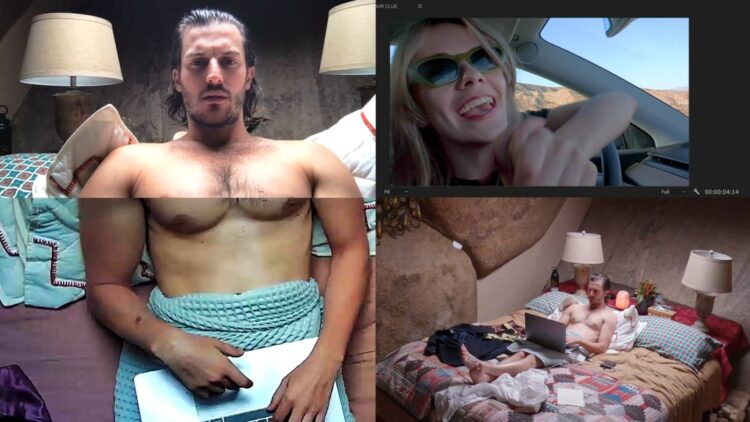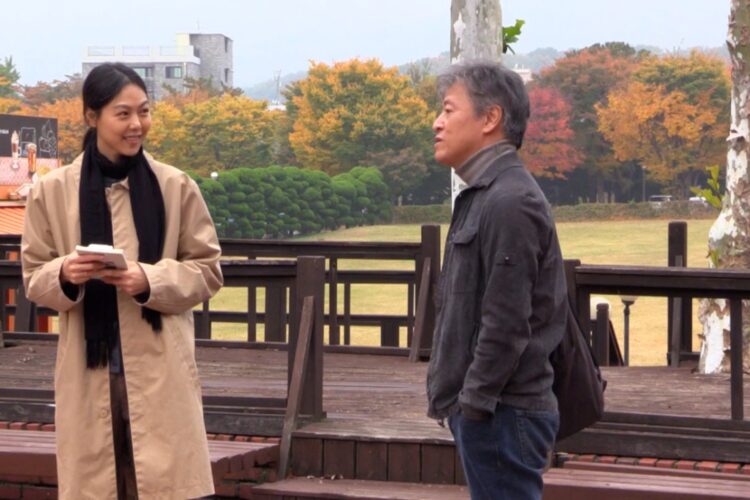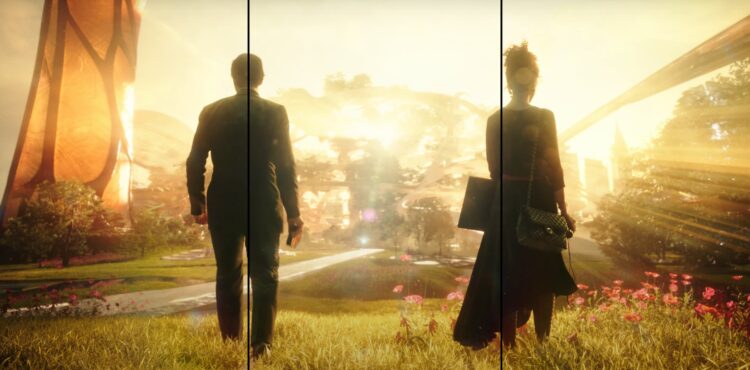

Ahead of its world premiere at the Fantasia Film Festival, The Code announced itself with several red flags. Set during the Coronavirus pandemic in 2021 with a synopsis throwing around terms like “cancel culture,” it stars Dasha Nekrasova and Peter Vack, filmmakers and divisive personalities who some might describe as reactionary trolls. This combination of hot-button issues with two leads known for pushing buttons could signal no more than empty provocation. Would The Code amount to a middle finger jabbed repeatedly in viewers’ eyes? Surprisingly, and thankfully, no. This is, first and foremost, a film by Eugene Kotlyarenko, and the choice to cast two controversial actors ties into his goals of engaging headfirst with the internet’s dominance and reshaping of culture over the past several years. While its attempts aren’t always successful, The Code makes an admirable effort to embrace what some might call the worst aspects of how we live now, to see what might come out on the other side.
The film unfolds as a fake documentary by Celine (Nekrasova), who wants to make a movie about the pandemic’s impact on people’s lives and relationships. Celine and her boyfriend Jay (Vack) rent a home in Joshua Tree for a week so she can work on her documentary. The trip is also meant to rekindle their relationship, as they’ve stopped having sex for some time. Jay goes along with Celine’s idea to include themselves in her film, though he confesses to a friend his hesitation after being “canceled” online a few years ago. His paranoia prompts him to spy on Celine’s phone and plant hidden cameras throughout the house without her knowledge; Celine catches on to Jay’s plan and begins spying on his phone as well.
It’s not an ideal set-up, but The Code‘s most compelling parts have nothing to do with plot. Kotlyarenko and DP Bart Cortright use dozens of cameras––phones, camcorders, the home’s security system, Jay’s cheap hidden surveillance––to capture and show everything at a relentless pace. A conversation rarely gets filmed as a back-and-forth. Scenes unfold in split-screens between Celine’s camcorder, multiple hidden cameras, even screen recordings of what Jay or Celine might be looking at on their phones, all of it playing out simultaneously. It’s overwhelming and disorienting by design, a bombardment that mimics our ability to access immense amounts of information with an unwieldy sense of curation.
Many of Kotlyarenko’s ideas result from this approach; he’s less interested in root causes than outcomes, how people’s behaviors adapt to these new levels of accessibility. Frenetic editing by Tucker Bennett and Sabrina Greco gives the film an assaultive quality that recalls the work of Ryan Trecartin––never boring, always too much. The Code functions best when its style highlights the contradictions within: non-stop consumption without ever feeling satisfied; searching for the truth by burying it in layers of artifice; the boundless forms of communication that provide more opportunities for insecurity and distrust. Rather than criticize these things, Kotlyarenko tries coming up with new ways to evoke the messy, complex states of mind that arise from a life lived online.
Does he succeed? Not quite. There’s a section where Jay uses his hidden cameras to film Celine saying something that can get her “canceled” which falls flat. Nekrasova and Vack’s performances are inconsistent, even lazy at times, switching levels of intensity on a scene-by-scene basis that suggests weak improvisation. (The supporting cast, which includes Ivy Wolk and Casey Frey, fare better and get the biggest laughs––they have the benefit of leaning into their eccentricities.) Beyond touching on aforementioned contradictions, the film doesn’t find much else to do with them. This could pertain to The Code‘s story, which isn’t more than a raunchy romantic comedy about a couple trying to get their groove back. It’s structured as a jarring back-and-forth between style and plot, spinning wheels while Kotlyarenko plays around with images before a weak narrative suddenly takes over. That incongruous quality doesn’t make the film add up to much beyond touching on some interesting ideas.
There’s much more to admire about The Code and its ambitions than how well it executes them. This premise could have easily bred something misanthropic, and my concerns going into the film speak to how much cynicism surrounds anything that tries tackling contemporary themes. Kotlyarenko turns out to be an optimist, and a bit of a romantic––Celine and Jay’s relationship may have fractures from navigating a new era of social media, but in the end they find their own way to reignite the spark between them. The idea to filter a traditional narrative through this specific, distorted lens may not work, but on a broader level The Code is refreshing in its hope that something positive can eventually come from all the chaos.
The Code world premiered at Fantasia International Film Festival.
The post Fantasia Review: The Code Finds Dasha Nekrasova and Peter Vack Pushing Through the Chaos of Modern Life first appeared on The Film Stage.



